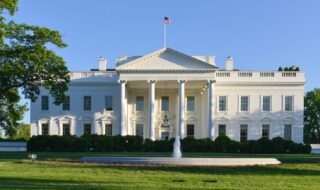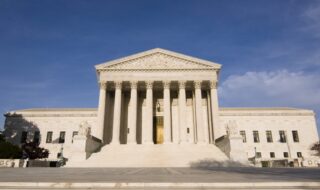Small Business Extremely Successful at U.S. Supreme Court in 2022-2023 Term
Small Business Extremely Successful at U.S. Supreme Court in 2022-2023 Term
June 29, 2023 Last Edit: June 5, 2025
Small Business Extremely Successful at U.S. Supreme Court in 2022-2023 Term
The NFIB Small Business Legal Center knows that small business owners deal with a myriad of daily challenges, including labor shortages, inflation, supply chain disruptions, and government red tape. The last thing small business owners need are court decisions making it even harder for businesses to operate and grow. This is why NFIB fights on their behalf in courtrooms across the country.
This includes advocating on behalf of small business interests at the U.S. Supreme Court. During the Supreme Court’s 2022-2023 term, NFIB participated in over 10% of the Court’s total cases. In the seven cases NFIB participated in on behalf of America’s small businesses, we are pleased to say that small businesses prevailed in six, representing more than an 85% success rate.
“In many ways, the U.S. Supreme Court acts as a final safeguard for the rights of small business owners,” said Beth Milito, Executive Director of NFIB Small Business Legal Center. “Burdensome mandates, inconsistent regulations, and costly penalties can make it impossible for small businesses to thrive. Thankfully, the Supreme Court agreed this term and acted largely in defense of the small business community. In several decisions, the Court reinforced the importance of Main Streets nationwide to their communities and the national economy.”
Sackett v. Environmental Protection Agency (EPA)
decision on May 5, 2023
WIN
When does a wetland qualify as a “water of the United States” under the Clean Water Act, giving the EPA jurisdiction? NFIB’s amicus argued that the Supreme Court should adopt the “relatively permanent” standard, a stricter test that narrows EPA jurisdiction. The Supreme Court unanimously rejected the “significant nexus” standard that courts and agencies have relied on to broaden EPA’s regulatory authority, and instead, a majority of the Court adopted the “relatively permanent” standard. This decision will give property owners with wetlands on their property more control over their land.
Glacier Northwest, Inc. v. International Brotherhood of Teamsters
decision on June 1, 2023
WIN
Does the National Labor Relations Act (NLRA) prevent state tort claims against unions for intentionally destroying an employer’s property during a labor strike? NFIB’s amicus argued that it does not. A contrary ruling would be costly for businesses and incentivize destructive behavior by employees and unions during a labor strike. The Supreme Court agreed, holding that the NLRA does not preempt state tort suits for intentional destruction of property during union strikes. This decision provides employers a remedy to recover for property damage by bad actors during labor strikes.
Tyler v. Hennepin County
decision on May 25, 2023
WIN
When the government seizes a person’s property to recover unpaid taxes and later sells the property, may it profit off the sale by keeping the excess beyond what was owed? NFIB’s amicus brief argued that it may not, and doing so violates the Constitution. The Supreme Court unanimously agreed, holding that when governments do so (a practice known as “home-equity theft”) they violate the Takings Clause of the Constitution’s Fifth Amendment.
Wilkins v. United States
decision on March 28, 2023
WIN
Is the Quiet Title Act’s (QTA) 12-year statute of limitations jurisdictional? Our brief argued that the statute of limitations is a nonjurisdictional claim processing rule. The Supreme Court agreed. Going forward, this means that property owners may have their day in court when challenging the government, even if it is past 12 years.
Coinbase, Inc. v. Bielski
decision on June 23, 2023
WIN
Does appealing a denial of a motion to arbitrate automatically halt judicial proceedings in the lower court? Our brief argued that it does. The Supreme Court agreed. The decision will save business owners litigating arbitration disputes time and money. Business owners can focus solely on the arbitration dispute in the appellate court, instead of having to focus on the arbitration dispute in the appellate court and the continuing action at the trial court simultaneously.
Bittner v. United States
decision on February 28, 2023
WIN
Are violations of the Bank Secrecy Act on a per-report, or per-account, basis? NFIB’s brief argued for the more lenient interpretation that violations are on a per-report basis. The Supreme Court agreed. This means that individuals failing to report foreign accounts will have penalties based only on not submitting the required reporting form, instead of penalties being stacked for each account not reported.
National Pork Producers Council v. Ross
decision on May 11, 2023
Loss
Is California’s Proposition 12, which imposes pork production requirements on the entire country, constitutional? NFIB’s brief argued that Prop 12 is unconstitutional and detrimental to businesses and the national supply chain. Unfortunately, in a highly splintered opinion, the Supreme Court disagreed. It remains to be seen what the impact of this decision will be. But for now, it appears that states may constitutionally impose their policy preferences on businesses hundreds, if not thousands, of miles away.
The NFIB Legal Center looks forward to continuing the success of small businesses when the Supreme Court begins its 2023-2024 term this Fall.
For questions on any of these cases or other Legal Center activity, contact us at info@nfib.org.
June 30, 2023
NFIB is a member-driven organization advocating on behalf of small and independent businesses nationwide.
Related Articles














